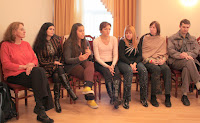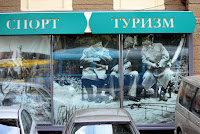Blues music (lyrics included) compresses history, pathos, and ecstasy into deceptively simple packages of sound that go far beyond my ability to analyze with words. I have to admire a scholar who tries! Nichols takes blues lyrics, shows links between them and the Bible (often mediated by the overlapping genre of spirituals), and also reveals how those lyrics reflect the realities of their writers' and performers' lives. Surrounding all these details are two overwhelming realities molding life and art alike: the thick social/political/economic/psychic reality of racism, and the "Christ-haunted" culture of the American South.
I've often wondered how to express the difference between musicians who inhabit the blues, and those who are just visiting. It's not strictly race--as Johnnie Billington says, "The blues is truth," which tells me that its core is universal--but it has something to do with being the one who is consumed rather than doing the consuming. It's not happy trails, it's more like the end of the line. Although the blues musician might lament being alone in the world, the appreciation of his or her music is definitely a communal experience--we've probably all been there, and we feel a bit strange when someone who may not have "been there" tries growling those lyrics.
Many blues lyrics are blunt about succumbing to addiction and temptation, describing unsentimentally what it's like to be at the end of the line, whether the cause is personal weakness or external oppression, or both. Sometimes the response is resignation; sometimes it's anger; sometimes it's prayer.
This is not music for those who can buy their way out of any pickle--but when we drop our facades of self-sufficiency, sooner or later we all confront mortal loss. In the meantime, the blues can give those with choices in this world a sensory sample of what it feels like to be without choices.
In Odessa, I attended Friends House Moscow's board meetings--my first experience of being back on the board after several years off. Highlights for me included adopting an ambitious English-Russian translation agenda, agreeing to seek funding for a promising new educational initiative for mental health providers, and a warm farewell (for now) to co-clerk Bonnie Grotjahn, who has given many years of loving service to Friends House Moscow, both on the board and, earlier, on the staff.
For me, one of the most inspiring moments was a wonderful Saturday afternoon session with fifteen facilitators from Alternatives to Violence Ukraine. (AVP background.) Although AVP deliberately transcends its Quaker roots and is "not allied to a particular faith or sect," we saw that a number of the facilitators have made fertile links between AVP and their own faith. As one facilitator told us, "The principles are very biblical." Another explained how AVP enabled her to respond to the pain she experienced the first time she visited a juvenile detention center. "Afterwards, I could not get the guys' faces out of my mind. I cried for three days." Through her AVP work, she began to see hope in their faces. "Sometimes, progress is very slow, almost invisible. But when I see hope in their eyes, it's as if I'm seeing God."
Our brief visit left me determined to visit the city of Odessa again. Even though it rained for 3-1/2 of our four days there, the beauty and humor of the city shone through.
My reading on the train included a Russian Protestant newspaper that someone was selling door-to-door along the length of our train carriage. Having mentioned Obama's Nobel Peace Prize last week, I should report, with as straight a face as possible, that he is now being nominated as the Antichrist. The newspaper columnist (citing this blogger) pointed out that Obama appears to conform to the Russian theologian Vladimir Solovyov's predictions concerning the Antichrist--that he would be a pacifist, an ecologist, and an ecumenist.
So is Obama the Antichrist? We can't know for sure, says the columnist, but "the fact that his policies are antichristian is obvious to any fair-minded observer."
Just a few links this week:
Christianity Today summarizes Nobel Peace Prize reactions, and other news.
Jon Watts produced the much-commented-upon "Dance Party" video clip--a five-minute serving of quakerly fun that delighted me for the first few seconds, until I listened to the lyrics. In this blog post, Watts reflects on the sudden attention and the mixed reactions he received. Whether you liked the clip or not (I'm afraid my reaction ended up being strongly negative), his thoughts are well worth reading.
ABS in English--"Science fiction by Arkadi and Boris Strugatsky for the English-speaking world." (And more here.)
Challenges facing the Mitchell mission in the Middle East--bitterlemons.org.
In honor of Gary Davis, here is Peter, Paul, and Mary's version of "If I Had My Way."
Many blues lyrics are blunt about succumbing to addiction and temptation, describing unsentimentally what it's like to be at the end of the line, whether the cause is personal weakness or external oppression, or both. Sometimes the response is resignation; sometimes it's anger; sometimes it's prayer.
This is not music for those who can buy their way out of any pickle--but when we drop our facades of self-sufficiency, sooner or later we all confront mortal loss. In the meantime, the blues can give those with choices in this world a sensory sample of what it feels like to be without choices.
In Odessa, I attended Friends House Moscow's board meetings--my first experience of being back on the board after several years off. Highlights for me included adopting an ambitious English-Russian translation agenda, agreeing to seek funding for a promising new educational initiative for mental health providers, and a warm farewell (for now) to co-clerk Bonnie Grotjahn, who has given many years of loving service to Friends House Moscow, both on the board and, earlier, on the staff.
For me, one of the most inspiring moments was a wonderful Saturday afternoon session with fifteen facilitators from Alternatives to Violence Ukraine. (AVP background.) Although AVP deliberately transcends its Quaker roots and is "not allied to a particular faith or sect," we saw that a number of the facilitators have made fertile links between AVP and their own faith. As one facilitator told us, "The principles are very biblical." Another explained how AVP enabled her to respond to the pain she experienced the first time she visited a juvenile detention center. "Afterwards, I could not get the guys' faces out of my mind. I cried for three days." Through her AVP work, she began to see hope in their faces. "Sometimes, progress is very slow, almost invisible. But when I see hope in their eyes, it's as if I'm seeing God."
Our brief visit left me determined to visit the city of Odessa again. Even though it rained for 3-1/2 of our four days there, the beauty and humor of the city shone through.
My reading on the train included a Russian Protestant newspaper that someone was selling door-to-door along the length of our train carriage. Having mentioned Obama's Nobel Peace Prize last week, I should report, with as straight a face as possible, that he is now being nominated as the Antichrist. The newspaper columnist (citing this blogger) pointed out that Obama appears to conform to the Russian theologian Vladimir Solovyov's predictions concerning the Antichrist--that he would be a pacifist, an ecologist, and an ecumenist.
So is Obama the Antichrist? We can't know for sure, says the columnist, but "the fact that his policies are antichristian is obvious to any fair-minded observer."
Just a few links this week:
Christianity Today summarizes Nobel Peace Prize reactions, and other news.
Jon Watts produced the much-commented-upon "Dance Party" video clip--a five-minute serving of quakerly fun that delighted me for the first few seconds, until I listened to the lyrics. In this blog post, Watts reflects on the sudden attention and the mixed reactions he received. Whether you liked the clip or not (I'm afraid my reaction ended up being strongly negative), his thoughts are well worth reading.
ABS in English--"Science fiction by Arkadi and Boris Strugatsky for the English-speaking world." (And more here.)
Challenges facing the Mitchell mission in the Middle East--bitterlemons.org.
In honor of Gary Davis, here is Peter, Paul, and Mary's version of "If I Had My Way."








Obama is probably not the anti-Christ, but there is a real problem in that many saw him as the Messiah (which he specifically said he was not). The Second Coming will not be in the form of an American Presidential candidate.
ReplyDeleteThis person's ideas are strange given that Obama is only arguably one of the three that he lists. He certainly is no pacifist, being a confirmed militarist who has increased the number of U.S. troops serving in foreign wars of aggression. His history is also not one of being an ecologist, as he has a background as a strong supporter of the coal and corn-based ethanol industries.
Hi, Bill!
ReplyDeleteBarack Obama operates well within the norms and expectations of politicians in the U.S. system. Maybe someday there will be a top-level politician who finds a way to break out of those powerful limitations--maybe even in a Gospel-guided direction. I doubt it will happen while the country is still the world's top superpower.
In the meantime, my hope and prayer is that, whenever a president makes a choice within the narrow range available, it is a choice in the direction of biblical values--putting away the sword in favor of other methods of managing conflict, upholding justice, bending the tasks of national stewardship toward the needs of poor and vulnerable people. That's not too much to expect of a president who campaigned on an anti-cynicism platform. Beyond that, igniting a genuine, holistic revival at the grassroots level is not Obama's job; it's the Holy Spirit's job, in collaboration with Christians who are sober about politics and politicians, yet still capable of being surprised by miracles.